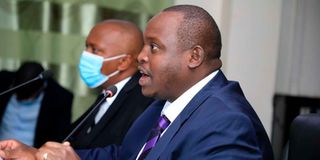Cofek calls for openness in fuel tender system

Energy and Petroleum Regulatory Authority (Epra) Director General Daniel Kiptoo when he appeared before National Assembly’s Departmental Committee on Finance and National Planning on October 12, 2021.
What you need to know:
- Consumers Federation of Kenya wants OTS tenders to be publicly advertised.
- It also wants the sizes of the cargo to be shipped in also made public.
The outcry over high cost of fuel that hit the roof last month has opened scrutiny on the open tender system (OTS) that Kenya uses to procure fuel.
On Thursday, MPs made sweeping proposals aimed at significantly reducing taxes and levies on fuel to lower the price of the commodity.
To further reduce the cost of fuel, Consumers Federation of Kenya (Cofek) has asked MPs to oversight the OTS.
The lobby wants OTS tenders to be publicly advertised to show the date of the contracts, the bidders, when the tenders were advertised, bids that were received and how they were evaluated.
Additionally, it wants the sizes of the cargo to be shipped in also made public, the past winners of the tenders since 2005, respective storage capacities of the bidders and the beneficial owners of the bidding companies.
Cofek wants MPs to order the Ministry of Petroleum to open up the OTS to all marketing companies not just in Kenya but also globally, and for the Competition Authority of Kenya (CAK) to analyse the dominance of a clique of firms that have been winning the tenders.
Pricing mechanism
“The purpose of the OTS was to ensure petroleum products, whose prices are regulated monthly in Kenya, remain competitive as per market conditions. However, the conduct of the activities of OTS, despite its name denoting “open”, remains opaque, shrouded in secrecy, and exhibits cartel-like behaviours, denying Kenyan consumers the benefits of competitive pricing,” Cofek secretary-general Stephen Mutoro petitioned Parliament.
“The current pricing mechanism does not make necessary disclosures on the procurement of fuel products, only making public a landed cost whose computation is not unambiguous as it includes demurrage and other charges such as shipping,” Mr Mutoro said.
Appearing before the National Assembly Finance and Planning Committee this week, Energy and Petroleum Regulatory Authority (Epra) director-general Daniel Kiptoo told MPs that the authority is not involved during the contracting of fuel importers. They only come in to ensure that the importers are licensed with them.
“We only look at the bidders that have won and factor in the contract prices in the fuel prices during the reviews. However, Epra has no role in the tendering process,” Mr Kiptoo said.
Demurrage is the charge that is based on the time a ship takes to offload fuel at the Mombasa port terminal for storage by Kenya Pipeline Company.
Delay of vessels
Documents tabled before the committee by the Ministry of Petroleum indicate that taxpayers pay a vessel Sh4.5 million per day for any delay at the port.
Between January and August, taxpayers have paid Sh1.3 billion for the vessels at the port.
MPs have raised concern that there is deliberate delay of vessels at the port for the owners to benefit for the demurrage charges
“There is a deliberate effort that the demurrage cost is incurred and it goes to specific people,” said Molo MP Kimani Kuria.
“There is nobody to audit and supervise the demurrage charges. Yet when we invite the CS for petroleum to appear before us, he hides,” said Luanda MP Chris Omulele.
But Petroleum PS Andrew Kamau said the information sought on OTS is publicly available, and that the government plays only an oversight role.
“The government does not buy fuel, our primary role is to facilitate smooth operation of the system to ensure that not only do Kenyans get fuel at the cheapest possible price but that fuel is always available,” PS Kamau told the Nation.






